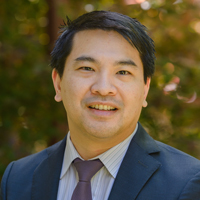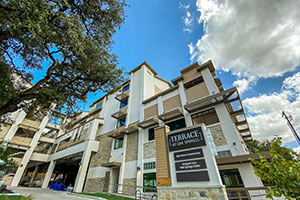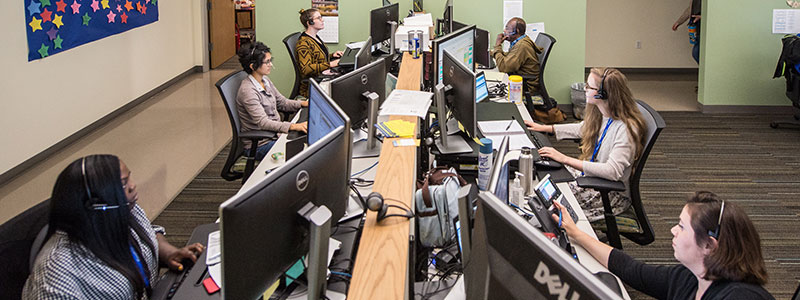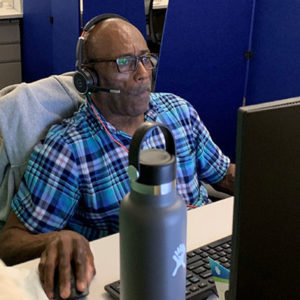TRANSPARENCIES
a monthly newsletter from Integral Care
a monthly newsletter from Integral Care

Through a newly launched Addiction Psychiatry Fellowship with Dell Medical School and our six existing substance use programs, Integral Care is working to combat the current opioid epidemic. In collaboration with Dell Medical School, we are meeting the epidemic head on – with a goal to increase addiction expertise in the region by training future leaders in addiction treatment, education, policy, and research.

John Nguyen, M.D.
The reality is that our country faces a shortage of addiction psychiatrists. And Central Texas has fewer addiction psychiatrists per capita than other areas. Numerous populations face extra barriers to receiving the care they need, such as people experiencing homelessness and those who lack health insurance. To meet the ever-growing need, Dr. John Nguyen, Integral Care’s Associate Medical Director and faculty member in the Department of Psychiatry and Behavioral Sciences at Dell Medical School, spearheaded the establishment of the Addiction Psychiatry Fellowship.
 Katherine Folse, M.D., Fellow |
 Scott Wallace, M.D., Fellow |
Fellows will receive advanced clinical training in our outpatient substance use treatment program and medication assisted treatment (MAT) clinics that specialize in opioid use disorder. Substance use disorder is a serious medical condition. It isn’t a character flaw. It is a brain-based disorder. Integral Care is proud to be on the leading edge of substance use disorder treatment by focusing on the MAT approach, which uses medication to manage and stop drug use, in combination with counseling and psychiatric care.

MAT client with counselor
This approach vastly improves outcomes – improving patient survival, increasing retention in treatment (retention hovers around 50%), decreasing illicit opiate use, improving health and well-being, and boosting employment for people with substance use disorder. All in all, it’s an evidence-based practice that’s helping people achieve recovery and reach their full potential.
Integral Care’s substance use services helped 1,366 people build their health and well-being in FY2021.
From MAT to outpatient detox to our residential recovery-based program, Integral Care bridges a gap in local treatment options, especially for populations who face tremendous barriers to care.
September is National Recovery Month so let’s recognize all the dedicated service providers and organizations across our community who are working to improve the system of substance use care in Austin-Travis County. I have genuine hope that our collaboration and innovative practices will make a difference in the battle against the current opioid epidemic.

David Evans
Chief Executive Officer
P.S. Please be aware of a sharp increase in drug overdose deaths tied to counterfeit pills laced with fentanyl. Fentanyl is a synthetic opioid, 100 times more potent than morphine. Read the DEA warning statement here.
Permanent supportive housing (PSH) is the most successful way to get people off the street and into a home. It’s also the most successful way people remain housed and never go back to those streets.
In PSH, people thrive and our community is stronger.

Terrace at Oak Springs
Terrace at Oak Springs (TAOS) is a perfect example of the PSH model. Watch our new video to hear from housing experts and one TAOS resident whose health and stability grows each day.
What is PSH? It’s a type of affordable housing which includes ongoing support services, such as case management, primary and mental health care, drug and alcohol treatment, nutrition and exercise services, and employment services. PSH is a healthcare intervention. Many recipients are trimorbid, meaning they live with mental illness, substance use disorder and a chronic health condition. They are the people who have the toughest time surviving on the street.
As Integral Care and collaborators across the city work together to ensure more people are housed, we are planning to expand PSH. It’s a successful, evidence-based approach that’s proven to carry significant public cost savings. When people have a safe place to live, appropriate support services and the tools they need to achieve well-being, recovery begins, and they can reach their full potential and contribute to their community.
“Integral Care is a leader….dedicated, mission-driven and highly qualified. They are well-positioned to provide a leadership role in the 988 implementation with both a strong crisis hotline, as well as excellent mobile crisis outreach teams and urgent care access. It is with the utmost respect, admiration and gratitude for the vital services provided by this outstanding agency and without any doubt or hesitation that I recommend re-accreditation for five years.”
We recently received notice that the American Association of Suicidology (AAS) is re-accrediting our 24/7 Helpline. As the quote indicates, the national AAS reviewer had glowing remarks for our entire agency.

Our Helpline provides free, immediate emotional support to anyone in the community, regardless of the language they speak. We are linked to the National Suicide Prevention Lifeline and answer calls from an additional 73 surrounding counties. Our qualified mental health professionals help resolve crises in the moment, assess needs and risk, collaborate on safety/coping plans and refer individuals to programs at either Integral Care or within their communities.
 In FY2020, our Helpline answered over 72,363 calls, a 10% increase from FY2019. Helpline staff also placed 120,358 follow-up calls to help ensure individuals were safe and receiving ongoing support; this is an 8% increase from the year before.
In FY2020, our Helpline answered over 72,363 calls, a 10% increase from FY2019. Helpline staff also placed 120,358 follow-up calls to help ensure individuals were safe and receiving ongoing support; this is an 8% increase from the year before.
Our Helpline saves lives and improves access to quality health care. We are proud to be a crucial part of the system of crisis care in Central Texas – in Travis County and beyond.
August 2021: Returning to School plus the Legislative Wrap-up
July 2021: Creating Lasting Change for BIPOC Mental Health
June 2021: Facts & Resources This Pride Month
May 2021: Mental Health Month
April 2021: How do we help Austinites experiencing homelessness?
March 2021: Growth and Positive Change
February 2021: How Do We Create a Better Future?
January 2021: Looking Ahead to the Legislative Session
December 2020: Supporting Your Mental Health This Winter
November 2020: How do we rebuild health and well-being during a pandemic?
October 2020: With Collaboration Comes Innovation
September 2020: Success Stories of Recovery and Suicide Prevention
August 2020: A Back to School Season Like Never Before
July 2020: Minority Health Disparities & COVID-19
June 2020: Stronger Together
May 2020: Surviving and Thriving During Uncertain Times
April 2020: Persevering During COVID-19
March 2020: Collaborations and Initiatives to Improve Health for the IDD Population
February 2020:Solutions to Health and Health Care Disparities
January 2020: Sucicide Prevention a Local Effort
December 2019: A Year of Thriving Care & Collaboration
November 2019: Teamwork and Collaboration Impact Homelessness in Travis County
October 2019:Making Strides for World Mental Health
September 2019: Taking Steps to Recovery Support
August 2019: Working Together for Child & Youth Mental Health
July 2019: Legislative Wrap-Up – Some Bipartisan Wins for Healthcare
June 2019: Strengthening Access for Veterans and the Entire Military Family
May 2019: Women and Mental Health
April 2019: Legislative Session Status Report
March 2019: Making Opportunities for Recovery More Accessible
February 2019: Recovery is Possible
January 2019: Stronger Outcomes Through Collaboration
December 2018: Looking ahead to the 86th Texas Legislature
November 2018: How Tech is Changing the Face of Mental Health
October 2018: A Few Questions Could Help Save a Life
September 2018: Anyone Can Save a Life
August 2018: A Milestone Moment
July 2018: Equity in Mental Health Care for All
June 2018: Expanding Services for Veterans
May 2018: Your Mental Health Toolkit
April 2018: Time of Terror Calls for Increased Emotional Support
March 2018: Stopping the cycle of incarceration for individuals with mental illness
February 2018: Equity in mental healthcare for everyone
January 2018 : Improving Mental Health Through Partnership & Collaboration
December 2017: Strength Through Community
November 2017 : Healthy Lifestyles Improve Well-Being
October 2017 : National Child Health Day
September 2017 : Strengthening Families and Communities